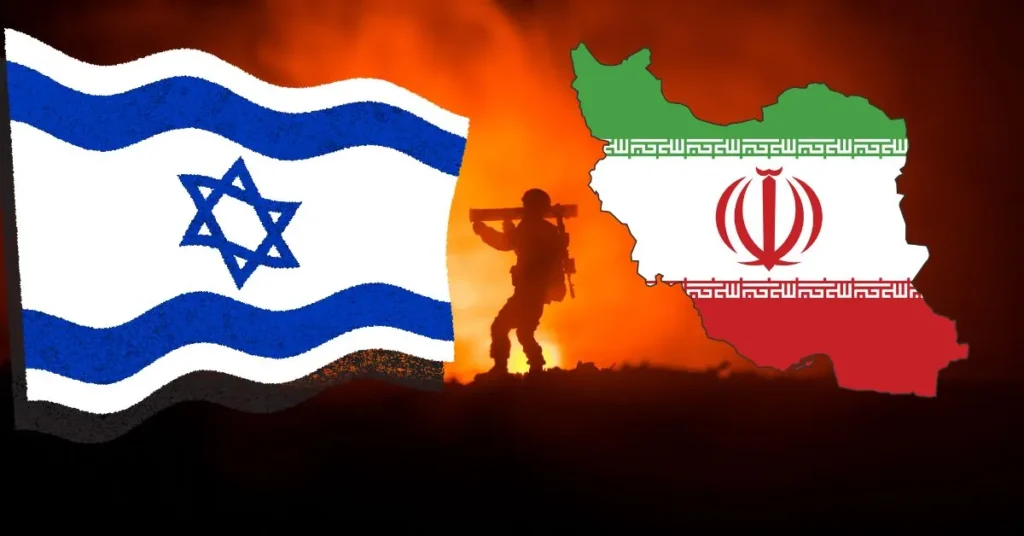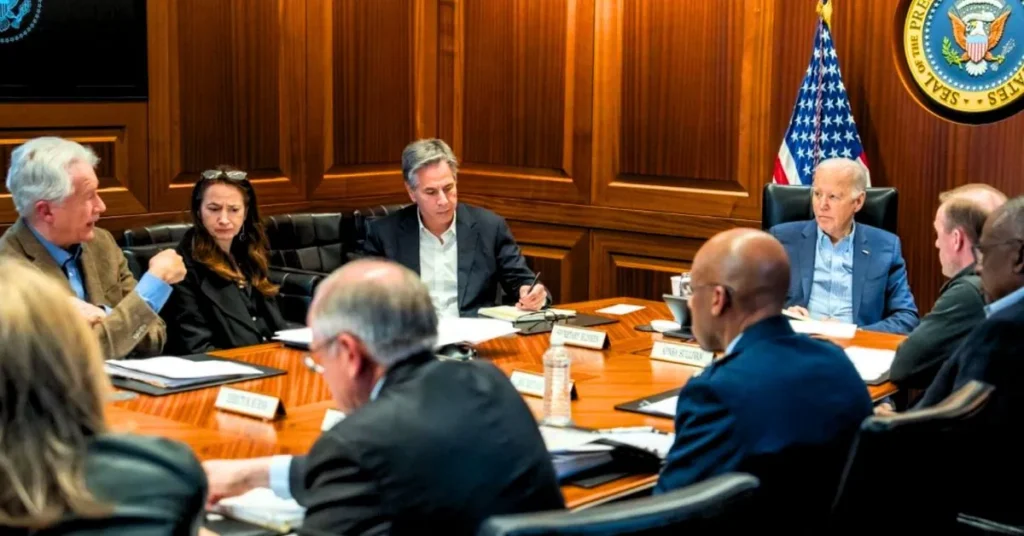Iran's bold attack directly targeting Israel on Saturday has brought about the very scenario President Biden had feared and worked tirelessly to prevent following the Hamas attack on October 7th—an escalation of the conflict spreading beyond its current boundaries.

Israel and Iran War
In the whirlwind of the Israel-Gaza conflict, President Biden finds himself walking a tightrope, balancing the need to ease tensions and prevent further escalation while navigating tricky domestic politics.
Just a short while back, cracks appeared in the once rock-solid US-Israel relationship. President Biden, visibly frustrated, raised concerns over the lack of humanitarian aid reaching Gaza and the tragic deaths of aid workers in Israeli strikes. The administration even hinted at reassessing its support for Israel, including potentially halting arms exports.
Read More: OJ Simpson Dead At 76 After Cancer Battle
However, a recent turn of events has shifted the landscape. Iran’s aggressive actions over the weekend, launching hundreds of missiles and drones at Israel, prompted a swift and successful joint defense effort by the US and Israel. This collaboration has reignited some of the old camaraderie, offering a glimmer of hope for influencing Israel’s response to the conflict.
While officials anticipate a response from Israel, they hope it will be measured and seen as an exercise in restraint. The White House is banking on this renewed cooperation to steer the situation toward de-escalation.
Yet, the path to peace remains fraught with challenges. The delicate balancing act extends to domestic politics, with pressure coming from both ends of the spectrum. Some urge a reevaluation of the US-Israel relationship, while others criticize perceived weaknesses in dealing with Iran.

As the world watches, the stakes couldn’t be higher. Every move carries the potential to tip the scales toward either peace or further turmoil. In this tense atmosphere, finding common ground and forging a path forward is more crucial than ever.
The recent joint military success over the weekend may seem like a positive development, but it also hides a concerning shift in the regional dynamics, as highlighted by former US envoy Dennis Ross, who has extensive experience in Middle East diplomacy spanning four decades.
According to Ross, Iran’s direct retaliation against Israel following an attack on its Quds Force officers in Syria signals a significant change in the Israel-Iran relationship. This retaliation, which involved targeting Israeli territory, breaks new ground and further destabilizes an already fragile situation.
For years, Iran has supported proxy forces intending to undermine Israel, while also providing funding and weapons to Palestinian groups like Hamas and the Shia militant organization Hezbollah in Lebanon. However, Saturday’s incident marked the first time since Iran’s Islamic Revolution in 1979 that it attempted a direct attack on Israel.
Ross argues that regardless of the military success in neutralizing Iran’s actions, this event signifies a critical moment—a crossing of a proverbial Rubicon. He suggests that it indicates a failure in deterring Iran from such actions.
Now, President Biden faces a challenging dilemma. He must find a way to de-escalate tensions with Iran while also making it clear that there are consequences for Iran’s actions. It’s a delicate balance that requires careful navigation.

In the aftermath of Saturday’s attack, the White House clarified that it wouldn’t participate in any Israeli military response against Iran, but it emphasized its unwavering commitment to Israel’s security.
Iran’s direct involvement in the ongoing conflict complicates efforts to negotiate a ceasefire in Gaza and secure the release of hostages held by Hamas.
US diplomats have been tirelessly working to persuade Israel to agree to a six-week cessation of hostilities, aiming to facilitate the release of both hostages from Gaza and Palestinian prisoners in Israeli custody. This agreement would also enable the delivery of much-needed aid to Gaza, where the threat of starvation looms large. Before the recent events, Israel had shown a willingness to engage, putting pressure on Hamas.
The situation is delicate, with domestic political pressures on President Biden from both the left and the right. Some on the left urge him to distance himself from Israel, while voices on the right criticize him for perceived weakness in confronting Iran.
Dennis Ross, a prominent figure in Middle East diplomacy, warns that Iran’s recent actions represent a dangerous escalation, potentially leading to further instability in the region.
Amidst these tensions, there’s a risk of misunderstandings and miscalculations, with the potential for a small misstep to trigger a larger conflict. The region is volatile, and the world watches with bated breath.
Now, everything hangs in the balance as the world waits to see how Israel will react.
Domestically, President Biden faces ongoing challenges. Some on the left push for him to distance himself from Israel, while critics on the right accuse him of not standing up to Iran strongly enough.
Dennis Ross, a key figure in Middle East peace efforts under both the George HW Bush and Clinton administrations, acknowledges the complexities. He notes that in an election year, there’s a desire to keep things under control. However, Iran’s recent actions mark a significant departure, potentially making the region more volatile.
The situation is fraught with the risk of misunderstanding and misjudgment. A single misstep could trigger a dangerous chain reaction, leading to further escalation.
The region is notoriously volatile, like a tinderbox waiting to ignite at any moment. The world holds its breath, hoping for calm amidst the uncertainty.